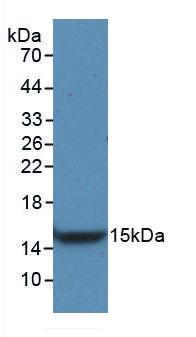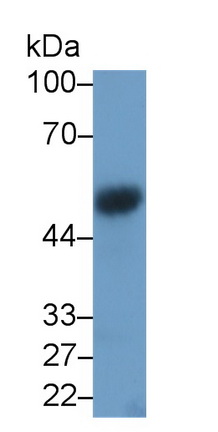Monoclonal Antibody to Vascular Endothelial Growth Factor C (VEGFC) 

VEGF-C; Flt4-L; VRPL; Vascular Endothelial Growth Factor-Related Protein
Overview
Properties
- Product No.MAA145Ra22
- Organism SpeciesRattus norvegicus (Rat) Same name, Different species.
- ApplicationsWB
If the antibody is used in flow cytometry, please check FCM antibodies.
Research use only - DownloadInstruction Manual
- CategoryCytokineTumor immunity
- SourceMonoclonal antibody preparation, Host Mouse
- Ig Isotype IgG2b Kappa, Clone Number D3
- PurificationProtein A + Protein G affinity chromatography
- LabelNone
- Immunogen RPA145Ra01-Recombinant Vascular Endothelial Growth Factor C (VEGFC)
- Buffer Formulation0.01M PBS, pH7.4, containing 0.05% Proclin-300, 50% glycerol.
- TraitsLiquid, Concentration 1mg/mL
Sign into your account
Share a new citation as an author
Upload your experimental result
Review

Contact us
Please fill in the blank.
Specifity
The antibody is a mouse monoclonal antibody raised against VEGFC. It has been selected for its ability to recognize VEGFC in immunohistochemical staining and western blotting.
Usage
Western blotting: 0.01-2µg/mL;
Optimal working dilutions must be determined by end user.
Storage
Store at 4°C for frequent use. Stored at -20°C in a manual defrost freezer for two year without detectable loss of activity. Avoid repeated freeze-thaw cycles.
Stability
The thermal stability is described by the loss rate. The loss rate was determined by accelerated thermal degradation test, that is, incubate the protein at 37°C for 48h, and no obvious degradation and precipitation were observed. The loss rate is less than 5% within the expiration date under appropriate storage condition.
Organism Species More: Homo sapiens (Human)Giveaways
Increment services
-
 Antibody Labeling Customized Service
Antibody Labeling Customized Service
-
 Protein A/G Purification Column
Protein A/G Purification Column
-
 Staining Solution for Cells and Tissue
Staining Solution for Cells and Tissue
-
 Positive Control for Antibody
Positive Control for Antibody
-
 Tissue/Sections Customized Service
Tissue/Sections Customized Service
-
 Phosphorylated Antibody Customized Service
Phosphorylated Antibody Customized Service
-
 Western Blot (WB) Experiment Service
Western Blot (WB) Experiment Service
-
 Immunohistochemistry (IHC) Experiment Service
Immunohistochemistry (IHC) Experiment Service
-
 Immunocytochemistry (ICC) Experiment Service
Immunocytochemistry (ICC) Experiment Service
-
 Flow Cytometry (FCM) Experiment Service
Flow Cytometry (FCM) Experiment Service
-
 Immunoprecipitation (IP) Experiment Service
Immunoprecipitation (IP) Experiment Service
-
 Immunofluorescence (IF) Experiment Service
Immunofluorescence (IF) Experiment Service
-
 Buffer
Buffer
-
 DAB Chromogen Kit
DAB Chromogen Kit
-
 SABC Kit
SABC Kit
-
 Long-arm Biotin Labeling Kit
Long-arm Biotin Labeling Kit
-
 Real Time PCR Experimental Service
Real Time PCR Experimental Service
Citations
- Alternatively activated RAW264. 7 macrophages enhance tumor lymphangiogenesis in mouse lung adenocarcinomaPubMed: 19241443
- Expression of COX-2 and VEGF-C in cholangiocarcinomas at different clinical and pathological stagesPubMed: 26125824
- Fenofibrate inhibits the expression of VEGFC and VEGFR-3 in retinal pigmental epithelial cells exposed to hypoxiaPubMed: 26622498
- IL-10 Indirectly Regulates Corneal Lymphangiogenesis and Resolution of Inflammation via MacrophagesPubMed: 26608451
- Interleukin-6 Induces Vascular Endothelial Growth Factor-C Expression via Src-FAK-STAT3 Signaling in Lymphatic Endothelial Cells.pubmed:27383632
- RNAi-mediated gene silencing of vascular endothelial growth factor C suppresses growth andinduces apoptosis in mouse breast cancer in vitro and in vivo.pubmed:27895746
- Characterization of isolated liver sinusoidal endothelial cells for liver bioengineeringPubmed:29582235
- Effects of diphyllin as a novel V-ATPase inhibitor on TE-1 and ECA-109 cellsPubmed:29328465
- Dynamic signature of lymphangiogenesis during acute kidney injury and chronic kidney diseasePubmed: 31019289
- Isotretinoin does not alter VEGF-A and VEGF-C levels: Do retinoids behave differently in dose-dependent and/or in vivo/in vitro conditions?Pubmed: 32722957







